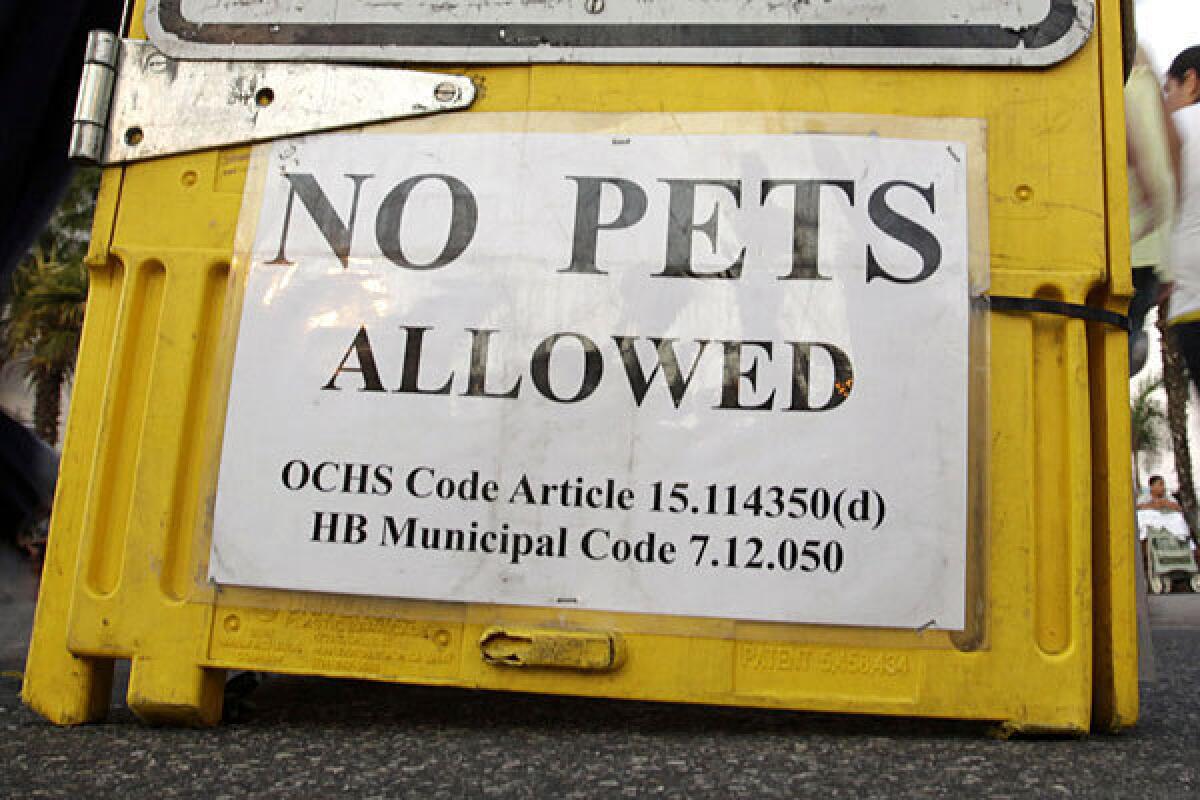Businesses say fake service dogs are a growing problem

- Share via
SACRAMENTO — Jim Power, a licensed trainer of guide dogs for the blind from San Rafael, was visiting a crowded Southern California theme park a week ago when he spied “a 20-something lady...with a Chihuahua on a leash.” The small pooch wore a vest identifying it as a service dog.
“It didn’t particularly look...very legitimate,” Power told a state Senate committee looking into what the disabled community, dog trainers and businesses call a growing problem: fake service dogs.
Representatives of the California restaurant, retail, hotel, apartment and condominium industries testified that dog owners, who don’t want to be separated from their pets, are abusing the Americans with Disabilities Act and other federal and state laws by falsely identifying their canines as working animals.
Broadly written laws that carry stiff financial penalties make it difficult for business owners to question an animal’s credentials, unless it misbehaves or isn’t housebroken, they said.
Fake service dogs, critics charge, can create health and safety problems for the public and sully the reputations of trained animals essential to helping people with disabilities.
“The problem is not necessarily with the folks who legitimately need service animals,” said Keri Bailey of the California Grocers Assn. at a Feb. 24 hearing of the Senate Business, Professions and Economic Development Committee. “There’s a growing trend of folks who just want to take their pet with them.”
As a result, “there’s not much” businesses can do besides allow the animal inside, Bailey said. “Otherwise, we face some pretty serious repercussions.”
For his part, committee Chairman Sen. Ted Lieu (D-Torrance) didn’t have any ready solution to the fake service dog complaints, other than to direct staff to continue exploring the issue.
Fast funds
Missing some money or stock certificates forgotten in a bank account or safe deposit box? They may be part of the state’s stash of “unclaimed property.”
State Controller John Chiang has come up with a way for accounts worth less than $500 to be quickly returned to their owners.
Find out how to get the funds with a step-by-step tutorial available online at https://www.sco.ca.gov or by calling (800) 992-4647 for information.
The new “e-claim” system has already made nearly $1.1 million in payments with an average wait time of 10 days since it launched Jan. 28, the controller’s office said.
Tax scams
The deadline for filing state income taxes is just six weeks off, and the Franchise Tax Board is warning taxpayers to be careful of scammers. Don’t give out any personal information, including Social Security numbers, credit card numbers or bank account information, on the phone or by email to anyone claiming to be a board employee, tax officials said. Hang up and call the tax board at (800) 852-5711 immediately, they say.
More information about the board’s Top Twelve Tax Scams publication and its privacy policy are available at ftb.ca.gov.
Twitter: @MarcLifsher
More to Read
Inside the business of entertainment
The Wide Shot brings you news, analysis and insights on everything from streaming wars to production — and what it all means for the future.
You may occasionally receive promotional content from the Los Angeles Times.











